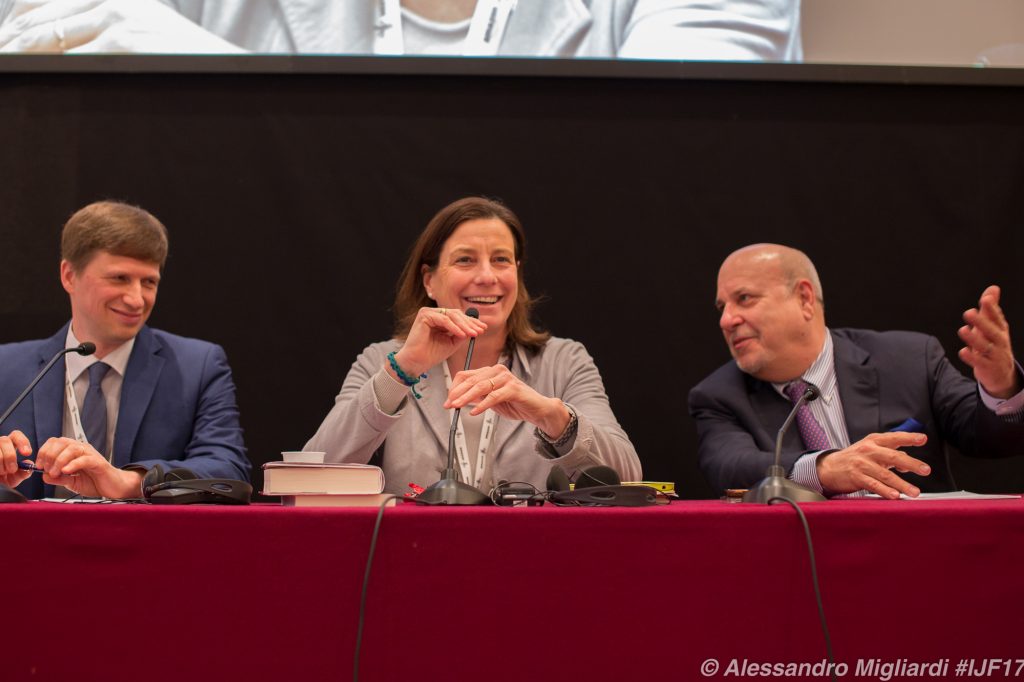Why (and how) did Donald Trump become the president of the United States and what happens next?
The panel discussion ‘America, The Whole World Is Watching‘ held on 5 April at the the International Journalism Festival in Perugia focused mainly on those questions.
The speakers attempted to explain the current political situation in the USA and in Europe by exploring in depth the historical and economic background. Whereas the topic of the discussion was clearly built around the recent political changes in America, both Alan Friedman and Andrew Spannaus paid particular attention to the ‘Russian question’ or, as Friedman described it, ‘Russian-gate.’
Friedman started the conversation by saying that, when it comes to Trump, he was usually asked why he got elected.
Friedman listed three main reasons to justify this unexpected victory:
- Trump had a very poor rival in Hillary Clinton, ‘a Democratic candidate who was hated, not trusted by 60% of American people. Americans were sick of the Clintons. And Hillary was just not a good candidate;’
- Trump was able to exploit the fear and the anger of a lot of poor white people, who were following him “like a savior” while he was making empty promises of building a wall, creating new jobs, and closing the borders,
- The involvement of Russia in the campaign: “We don’t know to what extent Russian secret agents were working actively together with Trump’s people, although there are some circumstantial evidences that suggest that.”
He noted that ‘the authoritarian nature of Trump’s campaign and the authoritarian nature of the current government [are] very worrying to those of us who once believed in human rights being an American value.’
Friedman pointed out that the Russian hacks, as well as the transmission of the information to WikiLeaks, are well-documented facts, while it is also clear that there were connections between Trump’s team and Russia ‘before, during and after the campaign.” The question regarding a possible ‘active coooperation’ between Trump’s staff and the Russians is however still under investigation, as is the alleged cooperation aimed at tampering the election process or some business connections between Trump’s family and Russia.
The scandal involving Russian influence on the election process is, in Friedman’s opinion, ‘the only thing that can undo Trump’s presidency in the nearest year or so’, whereas he admitted he considered the possibility of impeachment as difficult:”I don’t think the Republicans will impeach the Republican president, but the RussiaGate scandal is something you should keep your eye on.”
Andrew Spannaus had a slightly different opinion regarding the relevance of the Russian involvement in the election process.
“Right now we are in a very dangerous situation militarily between West and Russia,” said Spannaus while describing the existing policies towards Russia, and mentioning NATO expansion in the region surrounding Russia.
Regarding the theory of Putin helping Trump to win the election, he admitted to considering the possibility as ‘somewhat funny.’
He then added that he had no doubt that Russia had intervened with hacking attacks, but noted it was important to look at the causes that made it happen. “Is Donald Trump a Russian agent? No, I don’t think Donald Trump is a Russian agent,” said Spannaus, adding that the treatment of the Russian question is superficial.
“What we are seeing, we are seeing shadows. There is something behind this, there is a big political fight. There is a war going on in the institutions with Donald Trump and people around him who want to have better relations with Russia. And the general idea is that this is bad. Putin is evil, Putin is bad, therefore if Donald Trump does this, he is the traitor. I think there is very legitimate argument for changing our policy towards Russia”.
Spannaus underlined the importance of the economic situation which could provoke the changes in political preferences of the US citizens. He argued that, during the election campaign, ‘no one wanted to recognize the underlying process. And the underlying process was: we’ve had at least 30 years of economic policy which has left out a large portion of the US population.”
To Friedman, the economic situation in the USA has been increasingly lowering the position of poor people and Donald Trump saw that, managing to manipulate those people: “He managed to persuade them that he would be good for them”
He also mentioned the upcoming Trump meeting with the president of China, an interesting event to look forward to as, according to him, Trump ‘doesn’t know how to manage China.’ He expanded on his analysis of the future of US foreign policy by expressing his concern that, under Trump, China and Russia would develop into equals to America in power.
Friedman and Spannaus also touched upon the ideas of nationalism and racism which became almost prevalent in the politics of the United States and Europe, and therefore started influencing the election process. The former stated that Brexit could be influenced by the anti-immigrant campaign, ‘not [by] the European economic equation.’
Spannaus asked a rather rhetorical question, “What needs to change?” and attempted to answer it by saying that there is a difference between nationalism in the United States and in Europe: it is based on US identity which is different from the one European countries have constructed.
To both speakers, the growing popularity of nationalist views and the frustrating economic situation are extremely interconnected in European society, resulting in anti-immigration ideas.
Whether Trump’s idea of ‘making America great again’ will succeed in the end is uncertain, but both speakers admitted to feeling rather pessimistic when discussing the matter, but the world is definitely watching and trying to foresee what heppens next.
